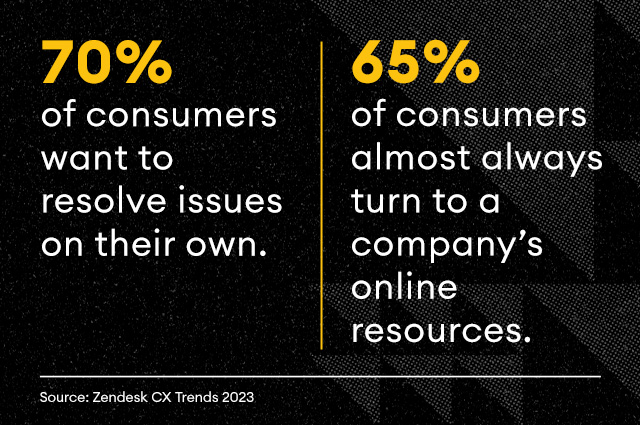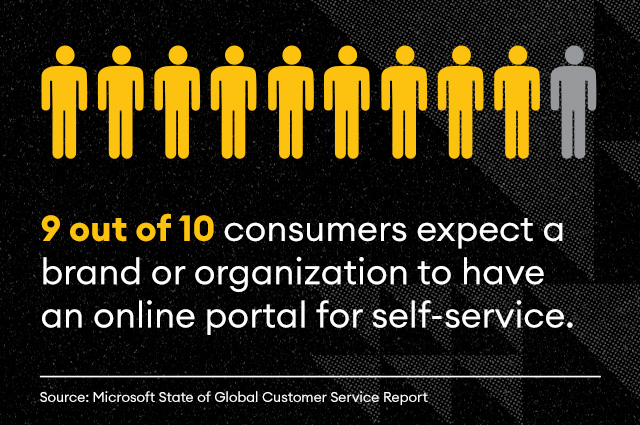It’s a fact: great customers have great expectations. Not only do your valuable customers expect an outstanding product or service, but they also demand an exceptional experience. And today, an excellent customer journey depends on meeting your customers where they are and accommodating ever-evolving demands.
One consistent trend is autonomy. Today’s customers want to help themselves — studies show that 70% of consumers want to resolve issues independently. Where do they go to find help? Online. Close to 65% of consumers always or almost always turn to a company’s online resources when they have a simple question or need a quick fix.

Customer portals: An inclusive CX solution
Combining today’s customers’ need for independence with other emerging CX demands like deeper personalization, more immersive experiences, and even conversation and connection seems like a heavy lift. But there is a solution that covers all of these needs: a thoughtful, well-designed customer portal.
Online customer portals have emerged as a vital component of successful business-consumer relationships. These dedicated digital platforms provide customers with a personalized and streamlined experience, allowing them to access essential information, manage their accounts, build affinity, and engage with your brand more efficiently and effectively.
But it goes even further than that. A great customer portal doesn’t just meet consumer demand; it also helps meet your company’s needs. Customer portals free up company resources and human capital, optimize internal processes, and much more.
What is a customer portal?
A customer portal is a secure, web-based platform that serves as a centralized hub for customers to interact with a business. It offers a range of self-service functionalities, such as accessing account information, making transactions, progress tracking, tracking orders, submitting support tickets, engaging with support agents, and retrieving relevant resources. You can easily empower customers and foster stronger relationships by giving direct access to these features.
Customer portals are a gateway to the various products, services, and information brands and businesses offer. By bringing together crucial functions in one place, customer portals simplify the customer journey and create a cohesive and engaging experience.
How do customer portals benefit consumers?
Customer portals aren’t just important; they’re necessary. Numbers from Microsoft’s Global State of Customer Service report indicate that nine out of 10 U.S. consumers expect a brand or organization to have an online portal for self-service.

These numbers make sense, too. Millennials and Gen Z, both digital natives, comprise nearly half of the U.S. population and significantly shape consumer trends. As self-service becomes the norm and younger consumers drive digital demands, online customer portals become even more essential.
Why are customer experience portals important to consumers? Here are three benefits to consider:
Customer portals provide space for seamless communication
As users embrace ChatGPT, Bard and Gemini, and other natural language processing AI platforms, the demand for conversational customer service will likely increase. Interactions in a customer portal can be protected and stored so that historical context is quickly available when a human takes over. They can pick up the conversation without missing a beat and provide seamless communication.
Portals let your business meet digital demand in real time
A recent ZenDesk study found that 72% of customers want immediate services. Customers appreciate the ability to access their account details, view past transactions, track orders, and make changes to their profiles on their time without relying on customer support.
Self-service options foster trust
By providing a secure and personalized space for customers to engage with the brand, businesses can use online portals to foster a sense of exclusivity and strengthen their relationships. Customers feel valued and trusted when they can easily access relevant information and resources, and this positively influences their perceptions of the brand.
How do customer portals benefit businesses?
From a business perspective, customer portals contribute to operational efficiency. By enabling customers to perform self-service tasks on their own, internal stakeholders can streamline the support processes. You’ll also likely be able to put your money where it matters, as self-service in an online portal costs less than one-on-one back-and-forth with an agent.
You can also use information from your online portal to improve experiences and drive data-backed decisions. Incorporating analytics and reporting capabilities into your portal gives you rich insights into customer behavior, engagement levels, and portal performance. Learn more about leveraging data-driven insights to improve customer experiences.
Another important consideration is that effective customer portals can help craft an outstanding employee experience. When consumers are empowered to meet their needs, your agents feel less pressure. They aren’t dealing with monotonously repeated questions and are free to focus on more complex issues, which can undoubtedly be more engaging and fulfilling.
And perhaps most importantly, a successful customer portal can enable growth and prepare for a profitable future. Your customer portal has the potential to become the central hub of your customers’ experiences. These self-service functions will meet consumer demands, lessen agent burden, and let you scale offerings as your business grows.
Learn more about Tallwave’s Digital Experience Design Services.
What does it take to make a great customer experience portal?
With so many benefits and significant touch points, interactions with customer portals can be make-or-break moments in the CX journey. A great customer portal empowers your customer with a cohesive and engaging experience.
Eleven considerations for CX portal success
There’s a lot that goes into creating a great customer portal and best practices must be considered. Here are 11 essential features and factors that go into making a successful product:
- User-friendly interface: A well-designed and intuitive interface ensures customers can easily navigate the portal, find the necessary information, and perform desired actions without confusion.
- Secure authentication: Robust authentication mechanisms, such as two-factor authentication, help protect customer data and ensure only authorized individuals can access the portal.
- Personalization: Customizable dashboards, personalized recommendations, notifications, account support features, and tailored content based on users’ preferences enhance the user experience and make the portal more engaging.
- Self-service functionality: The ability for customers to independently perform tasks, such as updating information, accessing essential documents, managing subscriptions, and initiating support requests, reduces their reliance on customer support and improves efficiency.
- Communication support channels: Integrating communication channels — including chatbots, live chat, support ticket systems, or community forums — allows customers to interact with support teams directly and receive timely assistance.
- Mobile responsiveness: Nearly 80% of smartphone users have used their devices to make purchases, so ensuring your customer portal is mobile-responsive is crucial. It should adapt seamlessly to different screen sizes and provide an optimal experience across various devices.
- Foster feedback: A great customer portal fosters a feedback loop that you can use to improve your audience focus. You can see what topics get the most engagement and track other metrics to leverage data for future improvements with built-in user feedback mechanisms.
- Data enablement: The metrics you collect from customer portal interactions can help you retain customers, enhance customer experiences, and achieve sustainable growth even as the economy shifts. Additionally, reporting and data visualization within the portal make key information accessible to stakeholders.
- Accessibility: Your customers are diverse, and your portal should be inclusive and accessible. This involves considering factors such as color contrast, text size, and compatibility with assistive technology.
- Seamless integration: A successful customer portal should integrate smoothly with existing systems, like CRM platforms, e-commerce solutions, and support ticket systems to provide a seamless end-to-end experience for customers.
- Continuous iteration: Product design and development teams should adopt an iterative approach, gathering user feedback and monitoring portal performance to identify areas for improvement and make ongoing refinements to enhance the user experience.
Empower customers and enable growth with Tallwave
Customer portals have revolutionized how businesses interact with their customers, offering a range of self-service capabilities and personalized experiences. By understanding the significance of customer portals and incorporating essential features and elements, you can leverage your portal to drive customer satisfaction, loyalty, and long-term success.
Tallwave has hands-on experience creating customer-centric online portals that empower and delight. We apply a heuristic methodology to evaluate how consumers interact with digital products, like online portals, and through our iterative design process, turn our findings into a successful product that exceeds the expectations of internal and external stakeholders.
Ready to learn more about Tallwave and how we can enable your business’s growth? Let’s explore the opportunities together.



